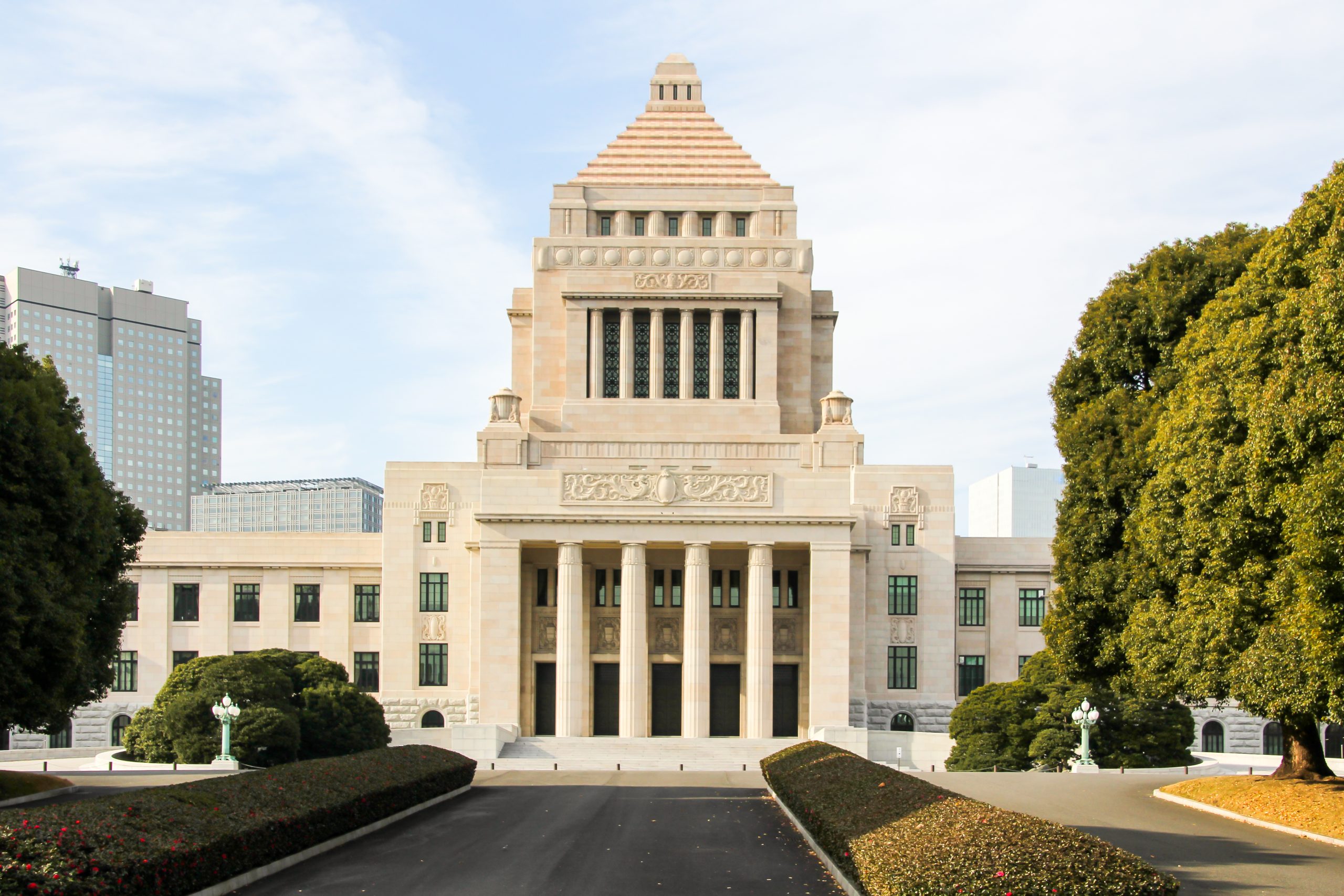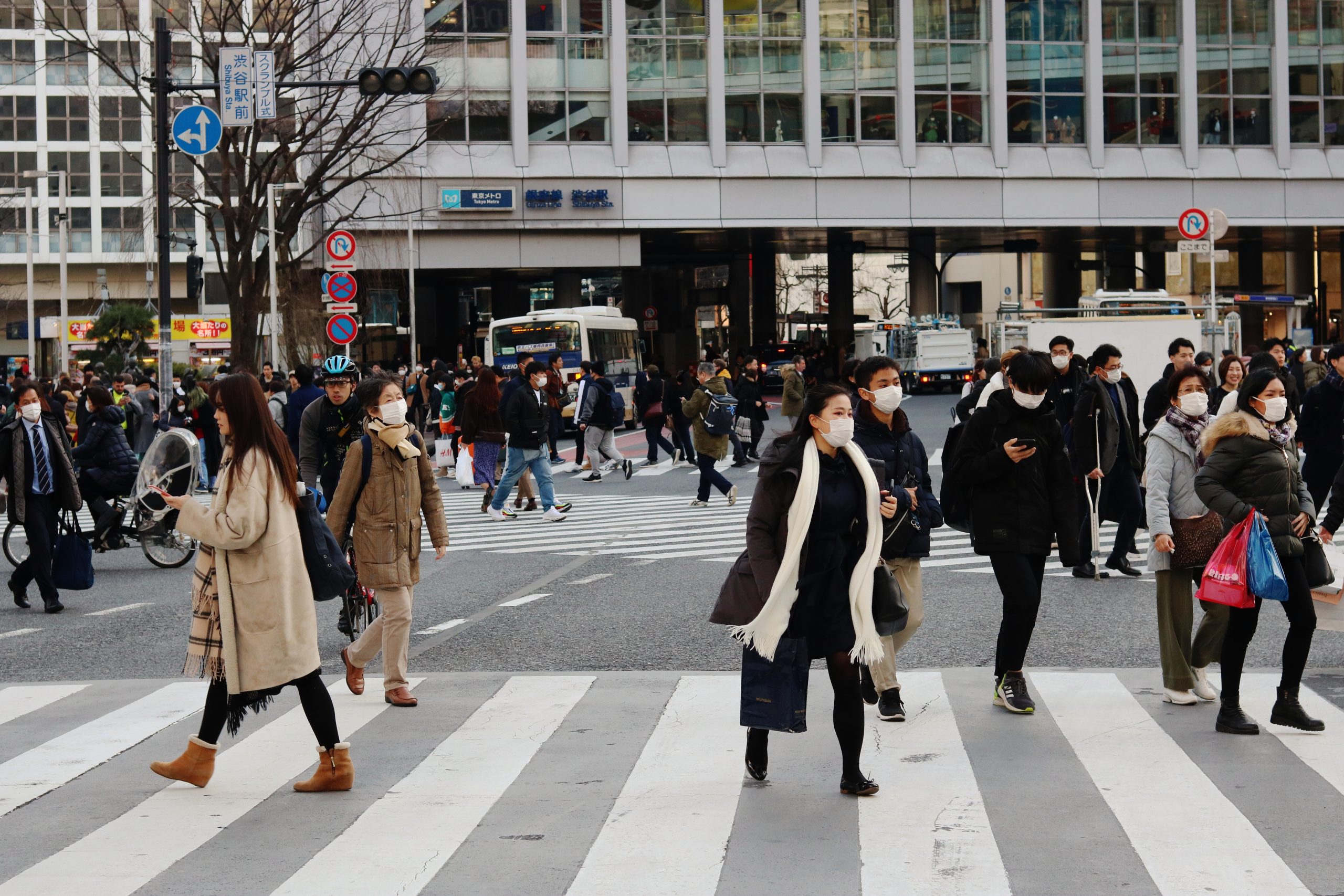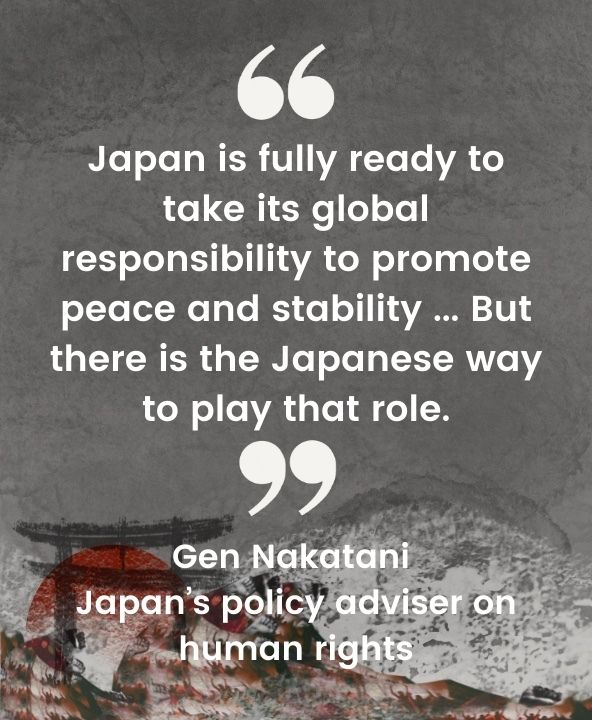Japan has rarely been on the frontlines when it comes to international human-rights campaigns, but lately it has come under pressure to step out of the shadows. With repressive governments rising in Asia and the United States once again asserting itself in the region, many are looking at Japan to live up to its image as a major player in the international community and to step up and speak out.
Even former Japanese Prime Minister Shinzo Abe, who continues to exert influence in the government, has championed Japan as a vibrant democracy that must push for a “free and open Indo-Pacific.” Abe, who stepped down in 2018, established a foreign policy aimed at countering China`s growing economic and military clout in Asia.

The Japanese Diet has passed resolutions putting a spotlight on the human rights situations on Myanmar, Xinjiang, Hong Kong, Tibet, and Inner Mongolia.
In fact, the Foreign Ministry has already allocated a new post starting April 2022 to focus strictly with violations in its existing Human Rights and Humanitarian Affairs Division.
Observers are also taking note of the recent online summit between U.S. President Joe Biden and Japanese Prime Fumio Kishida, where China’s suppression of Muslim Uyghurs in Xinjiang province and crackdown on pro-democracy activists in Hong Kong were among the topics they discussed.
But there may be no dramatic change in Japan’s involvement in human-rights issues outside its borders just yet.
“Japan is fully ready to take its global responsibility to promote peace and stability,” Gen Nakatani, who is Japan`s policy adviser on human rights to the government and an influential politician in the ruling Liberal Democratic Party (LDP), has said. “But there is the Japanese way to play that role.”
He was referring to Japan`s more muted stance toward the military junta in Myanmar in comparison with the West, which has imposed sanctions not only on the junta, but its leaders and a few other officials. Tokyo is also conspicuously less vociferous than, say, the United States in condemning human rights abuse around the world — indeed usually avoiding the word “condemn” in its official statements or declarations about actions taken by other governments.
Last June, for instance, the Japanese Diet passed a resolution on the February 2021 military takeover in Myanmar, calling only for “swift restoration of the democratic political process.” Then just last February 1, 2022, the Diet passed a resolution that, as Human Rights Watch Asia Division Program Officer Teppei Kasai points out, finally put the spotlight on human-rights issues in Xinjiang, Hong Kong, Tibet, and Inner Mongolia.
Although Kasai, in an article posted on the global rights watchdog’s website, says that having such a resolution passed “was no easy feat,” he also notes that it merely called for “monitoring of serious human rights situations in cooperation with the international community,” and “implementation of comprehensive relief measures.”
Revenues over rights?
Japan`s reluctance to play a hard-hitting role in addressing human-rights issues across the globe has long caused ire among rights advocates who accuse Japan of playing a double game. Tibetan Representative in Tokyo T.G. Arya, for one, says that Japan is a well-respected democratic and developed nation that gets to sit at global negotiation tables. Therefore, he says, it should come out openly to condemn wherever and whenever human rights and democracy are undermined.
Arya is a well-known campaigner who has been fighting for Tibetan rights under Chinese rule; China invaded Tibet in 1959. Commenting on Japan, he said, “Trade and economy is important but silence over the injustices is morally wrong.”

Japan may be a thriving democracy but domestic apathy toward “a more visible diplomacy” poses a challenge to the prospect of the country playing an active role on the global human rights front.
China is now Japan’s top trade partner, and is both its biggest source of goods and biggest market. In 2020, 27 percent of Japan’s imports came from China, totaling US$164 billion. Twenty-four percent of Japan’s total exports that year went to the Chinese mainland, or US$141.4 billion; including Hong Kong, Japanese exports to China reached US$174.41 billion or 29.4 percent of its total exports for 2020. In comparison, it exported US$119 billion to the United States, its second largest trade partner, during the same year, and imported US$72 billion worth of U.S. goods.
While Japan’s volume of trade with Myanmar is nowhere near those numbers, many major Japanese firms have considerable investments in the Southeast Asian country. Last December, the founder of the lobby and business group Japan Myanmar Association (JMA) Hideo Watanabe was even reported as urging the Japanese government to endorse the Myanmar junta since its head had “grown fantastically as a human being.”
Under pressure from rights groups, some JMA members — among them Toyota Motor Corp., JCB International, and garment-maker Musashi Fusoh — have quit the Association, however. Kirin Holdings, though, was still a JMA member when it decided to dissolve its joint venture with a military-owned firm last year. It was hoping to still have operations in Myanmar, but it recently announced that it will be pulling out of the country altogether.
Meantime, 12 Japanese businesses that were among those named in an Australian think tank’s report of companies linked to Uyghur forced labor told Kyodo News in February last year that they would stop relations with Chinese firms that have connections with such abusive labor practices.
Earlier last year, Ryohin Keikaku Co., which operates the Muji brand in China, also removed items marked “Xinjiang cotton” from its website after this was noted by Kyodo News. But it has apparently kept the products and their “Xinjiang” label on its Chinese website. Xinjiang is the region in China with the highest concentration of Uyghur Muslims, who have been targets of Chinese suppression. A Wall Street Journal article says that outside of Japan, half of Muji’s revenues come from China.
Unlike some Western democracies, Japan has not established a law that can authorize the government to impose sanctions against human-rights offenders. Nakatani, however, has commissioned human-rights experts to set guidelines that will direct Japanese companies when they do businesses in countries accused of clamping down on democracy. He has said that these would be aimed at guiding “Japanese companies about human-rights issues involving their own or partners` supply chains.”
According to the online media outlet Nikkei Asia, Economy Minister Koichi Hagiuda may soon be announcing what those guidelines are. In a February 14, 2022 report, Nikkei Asia said that among other things, these would include “developing inspection procedures”, as well as advising companies to ask suppliers using forced labor to “take corrective action,” and to “cut ties” with those that “fail to take such steps.”
In June last year, Nikkei Shimbun, Japan`s largest financial daily, reported that almost 80 percent of the Japanese companies it polled referred to human-rights violations as a growing risk to business. The same survey revealed that only 20 percent of the respondent-firms had established human rights policies.
Milder, less confrontational policy
International-relations expert Yoichiro Sato says that the pressure to play an active role on the global human rights front poses a dilemma for Japan.
“Traditionally, Japan has pursued a less confrontational policy with foreign countries given its diverse concerns from its past colonization of Asia and the need to balance economy and political policy,” remarks the vice dean at Ritsumeikan Asia Pacific University. “There is also an understanding that prioritizing economic development is the key to protect human-rights abuse.”
Sato says that Japan`s leadership in global human-rights protection is also hampered by domestic apathy. While Japan is definitely a thriving democracy, he says, the public “is not supportive of a more visible diplomacy.”

“This is another reason why the government remains reluctant,” says the veteran commentator on global issues. “Still, that stance is being challenged given the rapidly changing scenario between China and the United States.”
Close Japan-U.S. relations is a lynchpin in Asian democracy. The two powers closely collaborate in foreign policy and a military strategy under the U.S.-Japan Security Umbrella.
Sato views the recent online summit between Biden and Kishida as an illustration of two complementary roles that will be played by the two countries in the protection of human rights globally.
“The U.S. government is pushing for tough international legislation to force change, but also expecting Japan to keep the door open for dialogue,” he says.
Japan’s policy adviser on human rights also defends his country’s milder approach to human rights as serving a critical function. Argues Nakatani: “It is important to solve human rights issues through dialogue. Governments need to take action that is based on correct data of the situation.”
Hopeful rights advocates, though, see the appointment of Nakatani to his present post as itself a sign that Japan may finally be getting ready to speak up on human rights.
Respected as a veteran politician in Japan, the former defense minister promotes following the moves of the country’s close ally, the United States. Nakatani himself has close ties to Prime Minister Kishida, who appointed him as adviser to push through a more active government policy on international human rights, apparently counting on his seniority among LDP politicians to translate into support. Nakatani has led a non-partisan parliamentary association for reconsidering human-rights diplomacy and the enactment of a Japanese version of the Magnitsky Act.
But as the recent Diet resolution on the four rights hot spots in China shows, Nakatani has his work cut out for him. According to Kasai of Human Rights Watch, the resolution originally was more strongly worded, and not only explicitly named the Chinese government, but also used terms such as “condemnation” and “human rights abuses.”
Kasai says that it was the LDP’s coalition partner that “ reportedly pushed back, fearing such tough rhetoric might cause diplomatic frictions.”
“Although many ruling and opposition lawmakers criticized the watered-down resolution,” Kasai adds, “it passed the lower house by a majority vote.” ●
Suvendrini Kakuchi is a Sri Lankan journalist based in Japan, with a career that spans almost three decades. She focuses on development issues and Japan-Asia relations.

















